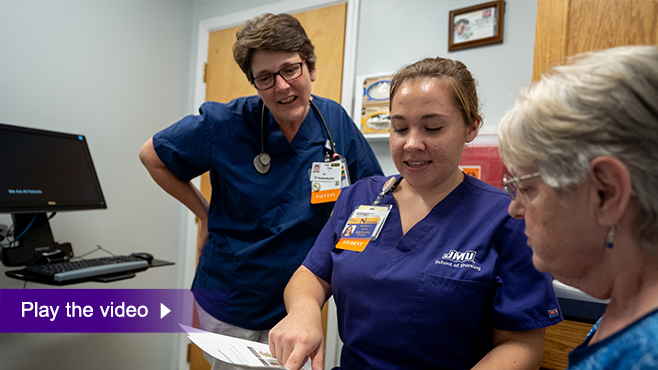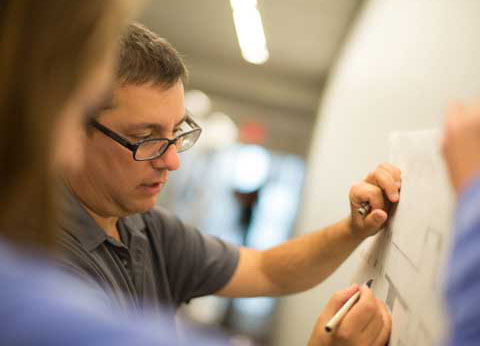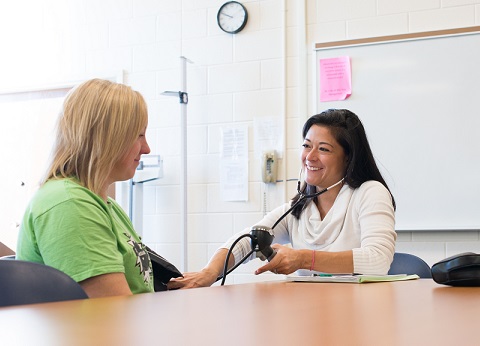Program Overview
Degree Offered
Master of Science in Nursing (M.S.N.) in Nursing - See Concentrations and Options
‘The School of Nursing cultivates leaders who are collaborative, service oriented, globally minded, and effective advocates for their clients, their communities, and their profession.’
— Dr. Melody Eaton, Interim School of Nursing Director
Quick Facts
Mode of Delivery
Hybrid (on campus and asynchronous online) or Online (depending on concentration)
Full-time or Part-time
Typical Duration
2-3 years (Full-time) or 3-4 years (Part-time) Depending on Concentration
96%
FNP certification pass rate on first attempt
Description
All concentrations are designed to meet the Essentials of Masters Education in Nursing (AACN, 2011). Students are admitted for full-time or part-time study. Full-time students can complete the program in four full-time academic semesters. The FNP (or Family / Across the Lifespan) concentration requires 49 credits. The FNP concentration meets the competencies outlined by the National Organization of the Nurse Practitioner Faculties (NONPF) and the American Association of Colleges of Nursing (AACN). Students complete 750 contact practicum hours. The AGPCNP concentration requires 46 credits. The AGPCNP concentration meets the competencies outlined by the National Organization of Nurse Practitioners (NONPF) and the American Association of Colleges of Nursing (AACN). Students complete 750 contact practicum hours.
The leadership options are Clinical Nurse Leader (CNL), which requires 38 credit hours or Nurse Administrator (NA), which requires 32 credit hours of study for applicants who have a BSN. The Essentials of a Bachelor of Science in Nursing. A graduate of the Bachelor of Science in Nursing. During this transcript review, the plan of study may include up to 11 extra credits. Graduates of the CNL are providing leadership in providing direct clinical care. The NA concentration prepares graduates to assume management positions within health care organizations. Students are admitted for full-time or part-time study. The CNL option is designed to meet the competencies established by the American Association of Colleges of Nursing (AACN); and the Nurse Administrator is designed to meet the competencies established by the American Organization of Nurse Executives (AONE). Students complete 480 hours of practicum experience. Graduates of the CNL program are eligible to take the CNL certification examination offered by the Commission on Nurse Certification.
The Nurse Midwifery option is offered in conjunction with Shenandoah University. Students complete the first year of study (22 credits) at James Madison University and the second year of study at Shenandoah University (26 credits). The JMU credits can be taken part-time or full-time. The second year of nurse midwifery is taken in full-time at Shenandoah University. Upon completion of the full curriculum, students will graduate with an MSN degree from James Madison University and a Post Graduate Certificate in Nurse Midwifery from Shenandoah University.
The Psychiatric Mental Health option is offered by Shenandoah University. Students complete the first year of study (22 credits) at James Madison University and the second year of study at Shenandoah University (29 credits). The JMU credits can be taken part-time or full-time. The second year of psychiatric mental health is taken in full-time at Shenandoah University. Upon completion of the full curriculum, students will graduate with an MSN degree from James Madison University and a Post Graduate Certificate in Psychiatric Mental Health from Shenandoah University.
Concentrations
- Adult / Gerontology Primary Care Nurse Practitioner (AGPCNP)
- Clinical Nurse Leader (CNL)
- Family Nurse Practitioner (FNP)
- Nurse Administrator (NA)
Options
The James Madison University School of Nursing also offers a Master of Science in Nursing degree in conjunction with Shenandoah University with options in:
- Nurse Midwifery (NMW)
- Psychiatric Mental Health Nurse Practitioner (PMHNP)





